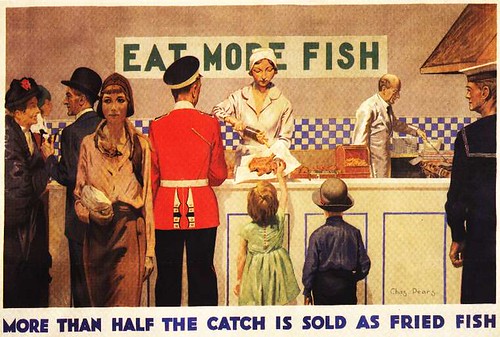In many ways this poster from 1926 demonstrates how important fish and chips was, and still is, as a dish to British identity. All walks of life, all ages, all feel the pull, all are sustained by the fish and chip shop, social barriers are irrelevant, an empire built on good honest food. From it's military to its businesses and even its most vulnerable, this dish is a dish to build a nation upon. As a gastronomic symbol for a nation it represents aspects of a British character that perhaps more rarefied nations don't feel the need to impress upon others. This is no frills food that started industry and won wars with little need for romance. Utilitarian food that fills the stomachs of hard working and fighting people. Yet, there is romance attached to this meal, there is a whiff of sex to it. The smell of chips loaded with salt and vinegar hints at that ozone tinge of the sea and recalls dirty weekends in seaside towns, Mods and Rockers fighting on Brighton seafront, of shared bags of chips with friends and lovers.
As is usual with food viewed as being owned by a particular country or culture the dish itself comes from elsewhere. An amalgam of Spanish and Portuguese Sephardic Jewish and French staples brought in the country though trade into London and Manchester in the 17th and 18th century, it flourished amongst working class populations in both towns in the 19th century and both still claim the very first fish and chip shop, though it seems Joe Malins shop in London opened in 1860 was probably the first. It's status as a truly national dish comes from the fact it was one of the few foods not to be rationed during the Second World War.
Regional variations in the dish are strong. Traditionally, cod was a southern fish whilst fish and chip shop regulars in the north preferred haddock and a potato scallop, the Scottish love of all that is deep fried found fame with the deep fried Mars bar. The variations as you go further a field into Australia and New Zealand get truly bizarre with the addition of chicken salt.So I sat in the chippie this evening watching the very nice Estonian guy fry my fish and tried to get a sense of what the dish says about the British. Then it dawned on me that growing up every chippie I went to were all run by Chinese people, these days Eastern Europeans seem par for the course and that gave me pause to smile before pondering whether to have a pickled egg or a gherkin with my chips

No comments:
Post a Comment